新概念英语第一册Lesson49-50
新概念英语第一册第49-50课
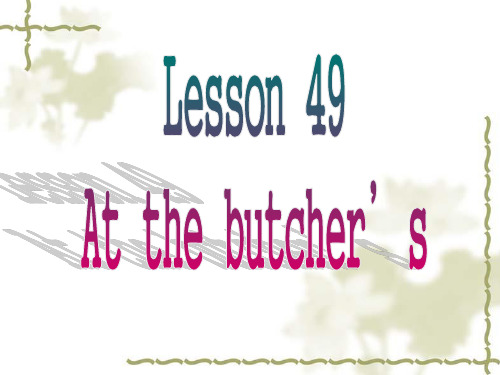
butcher
❖ ---Do you eat meat every day? ❖ 你每天都吃肉吗? ❖ --- _____________.
Key words
u.n.
beef
meat--肉类统称
lamb mutton
butcher
steak mince
I have to go to the butcher’s.
doctor – doctor’s
在英文表示“某一商店”的商店中,往往可 以把shop省略,如课文中的the butcher’s (shop)和the greengrocer’s (shop),类似 的例子还有the hairdresser’s (shop),the stationer’s (shop),the doctor’s (office), my mother’s (house)等。
❖ --- Does she like bananas? --- Yes, she do. She like bananas, but she doesn’t want any.
Orange, sweet orange
❖--- Do you like oranges? ❖--- Yes, I do.
I don't like chicken either!
Detailed study about the passage
❖At the butcher’s在肉店
❖ 方位副词at与in的区别是,at和in在…里;但 at表示的地方较小,而in表示的地方很大, 例:
❖ at the school ❖ at home ❖ in China ❖ in Asia ❖ in Changzhou
新概念英语-第一册Lesson-49-50(共28张PPT)
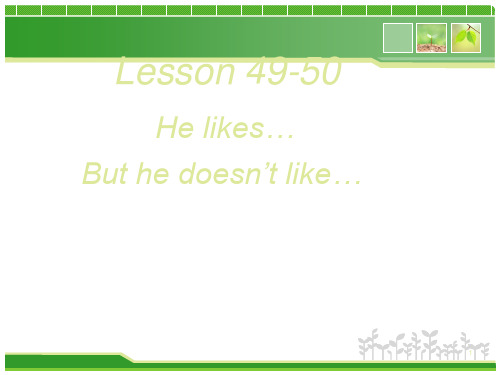
Does Jason like fresh lettuces? Yes, he does. He likes lettuces, but he doesn’t want any.
8
Does Nick like whisky? Yes, he does. He likes whisky, but he doesn’t want any.
11
Does Miss Zhang like choice peaches?
Yes, she does.
She likes peaches,but choice peaches:上等 she doesn’t want any.
的,精选的桃子。
12
Does your grandma like ripe bananas?
20
Listening
Books closed. Listen to the tape , then answer these questions.
• What does Mr. Bird like? He likes steak.
• What does Mrs. Bird like? She likes lamb.
1.Yes, he does. He likes cabbage,but he doesn’t want any. 2.Yes, he does. He likes lettuce,but he doesn’t want any. 3.Yes, I do. I like peas, but I don’t want any . 4.Yes, she does. She likes beans,but she doesn’t want any. 5.Yes, I do. I like bananas, but I don’t want any . 6.Yes, she does. She likes oranges,but she doesn’t want any. 7.Yes, he does. He likes apples,but he doesn’t want any. 8.Yes, she does. She likes pears,but she doesn’t want any. 9.Yes, I do. I like grapes, but I don’t want any . 10.Yes, she does. She likes peaches,but she doesn’t want any.
新概念第一册Lesson49-50
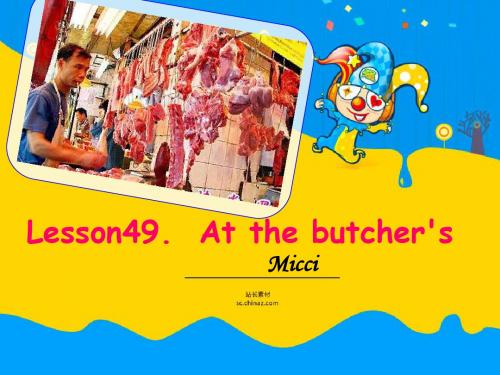
Text
• BUTCHER: Do you want any meat today, Mrs.Bird?
• MRS. BIRD: Yes, please. • BUTCHER: Do you want beef or lamb? • MRS. BIRD: Beef,please. • BUTCHER: This lamb's very good. • MRS. BIRD: I like lamb, but my
Lesson49. At the butcher's
Micci
猪肉 羊肉 鸡肉 牛肉
Have you ever been there?
at the butcher's 在肉店
at the doctor's 在诊所
at Mr. Smith’s 在史密斯家
butcher 卖肉的,屠夫 /u/ /ə/
Eg: The boy is at the butcher's . He wants to buy some meat .
meat 肉 /i:/
Eg: Do you want any meat?
mince 肉馅 /I/
Eg: I want a pound of mince, because I want to make some dumplings.
eg. The teacher tell you to remember this sentence. You should tell him to clean the floor.
1. 我妈妈叫我去做作业。 eg. My mother tells me to do the homework.
tell sb not to do sth. 告诉某人不要做某事 eg. My father tell me not to play the computer
新概念第一册49-50
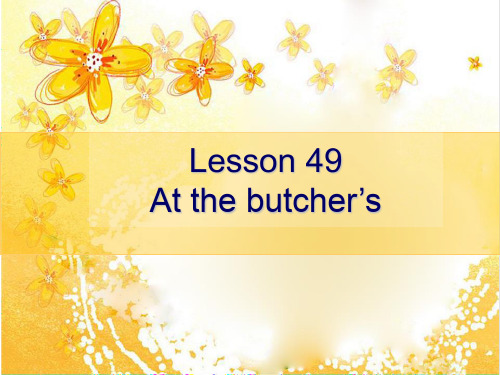
★ butcher n. a person who sells meat
e.g.: The old man is a butcher .
at the butcher's 在肉店 a place where you can buy meat
eg: The boy is at the butcher's . He wants to buy some meat .
1.▲ speak作及物动词,意为“说”“讲”,其宾语 常是某种语言。如:speak French说法语; 2.表示说到什么人或事,须用介词about/ of /on引出 的短语。如:They all spoke on folk music. 3.speak也作不及物动词,主要表示说话的本能和方 式,发言等。例如: The baby is learning to speak. speak+ 语言 speak of 意为“提到、说起” speak to sb对某人讲话
▲tell意为“告诉,对…说”.告诉的内容 可以和to连用 作及物动词,如: I can’t tell the bad news to you. =I can’t tell you the bad news. My mother tells me to buy some fruit. tell the truth 说真话 tell a lie说谎 tell the time “报时“ tell a story讲故事 tell about a person / a game / a success tell sb. sth./ tell sth. to sb. tell sb. to do sth. tell : 辨别,说出区别 tell A from B tell the differences between A and B
新概念英语第一册 Lesson49 —50 (共25张ppt)

2. — _______ I borrow your MP3? — Sure. Here you are. A. May B. Should C. Must D. Would 3. — May I go to the cinema, mum? — Certainly, but you ________ be back by 11 o’clock. A. can B. may C. must D. need 4. You ______ get there by bus. A. don’t need B. needn’t to C. don’t need to D. need don’t to
— Of course, you ______. A. can B. should C. could D. must
11. —Whose pencil box is this?
—It _____ be Tom’s. It has his name on it.
A. must
B. may C. might
Lesson 49-50
cabbage /ˈkæbɪdʒ/ 卷心菜 lettuce /ˈlɛtɪs/ 莴苣 pea /piː/ 豌豆 bean /biːn/ 豆角 peach /piːtʃ/ 桃 ,桃红色 butcher /ˈbʊtʃə/ 屠夫,卖肉者 meat 肉 beef /biːf D.do
5. How she to America? A.do;go B.is; go C.does; go D.does; goes
6. Where’s my purse? I it. A.am not finding B.am not seeing C.can’t find
too ... to 太······以至于不能 He walked too slowly to catch up with me. 他走得太慢而不能跟上我。 Tom is too young to go to school. He is too young to look after himself. He is not strong enough to carry the box. =He is too weak to carry the box.
新概念英语第一册Lesson49-50 At the butcher's 小学英语初中英语全国通用

A. you're welcome
B. please
C. thank you
查看答案解析
答案:thank you 解析: 考查曰常用语 thank you 谢谢; please int. 请; you're welcome 不客气; 如果不要某东西 , 回答的时候要说thankyou表示礼貌;一般肯定回答为" Yes, please." 否定回 答为 "No, thank you. " 译文:“你想要一杯果汁吗?” “不,谢谢。”
上一题
下一题
根据提示按要求填空。 不要害怕! Don't be a ________ (填本课学过的一个动物)
正确答案: chicken
查看答案解析
答案:chicken 解析: 考查词义 chicken n. 鸡肉(不可数);小鸡(可数); 这里前面有不足定冠词a,所以此处取“小鸡"的意思, 小鸡给西方人的印象是胆小怕事;
/ No, he doesn't want a new schoolbag.
Language Point
语句讲解、课文讲解
小结:主语是单数第三人称<he / she / it>时 , 如果想用do提问 , 要变成do的单数第三人称形式does。
用do进行省略回答时: 肯定语气:用动词do代替其他实义动词 , 单数第三人称为主语时 ,
做个小练习 巩固一下吧~
根据提示填空。 — Do you want beef or lamb? — _________ , please. (牛肉)
正确答案: Beef
查看答案解析
答案:Beef 解析: 考查词义 beef n. 牛肉; 译文: ”你想要牛肉还是羊肉? ” “牛肉。 ”
新概念英语第一册第49-50课完整版

egg: The boy is at the butcher's . He wants to buy some meat .
I have to go to the butcher‟s. doctor – doctor‟s
在英文表示“某一商店”的商店中,往往可 以把shop省略,如课文中的the butcher‟s (shop)和the greengrocer‟s (shop),类似 的例子还有the hairdresser‟s (shop),the stationer‟s (shop),the doctor‟s (office), my mother‟s (house)等。
1.
1.▲
speak作及物动词,意为“说”“讲”,其宾语常是 某种语言。如:speak French说法语; 2.表示说到什么人或事,须用介词about/ of /on引出的短 语。如:They all spoke on folk music. 3.speak也作不及物动词,主要表示说话的本能和方式, 发言等。例如: The baby is learning to speak. speak+ 语言 speak to sb. speak about/ of/ on sth. speak of 意为“提到、说起” speak to [with] sb (about sth)
2. I will pick you up.
我来接你。
New words and expressions
1 butcher [„butʃə] n.卖肉的 2 meat [mi:t] n.(食用)肉 3 beef [bi:f] n.牛肉 4 lamb [læ m] n.羔羊肉 5 husband [„hʌzbənd] n.丈夫 6 steak [steik] n.牛排 7 mince [mins] n.肉馅,绞肉 8 chicken [„tʃikən] n.鸡 9 tell [tel] v.告诉 10 truth [tru:θ] n.实情 11 either [„aiðə] ad.也(用于否定句)
新概念第一册Lesson49-50图文

I like lamb, but my husband doesn’t.
1) but 表示转折,意为“但,然而,尽管如此” e.g.他不喜欢音乐,可他的妻子却很喜欢。 He doesn’t like music, but his wife does. 2) 句中的doesn’t 后面省略了like lamb. 整句应为I like lamb, but
❖either adv. (也)
My husband likes steak .
I like steak too .
=I also like steak .
Do you like steak too ?
My husband doesn't like chicken
I don't like chicken either .
my husband doesn’t like lamb. 用but 连接的并列句,在后一半句中可以省略与前半中相同的
Do you want beef↑ or lamb↓?
❖ or “或者”表选择 ❖ 选择疑问句↑ or ↓ ?
What about some steak?
❖ What about…? …怎么样? ❖ What about…?=How about…?
What about sth.? 某物怎么样?
What about doing sth.?做某事怎么样? 练习:1. 来杯咖啡怎么样?
____W_h_at_a_b_ou_t_a _cu_p_of_c_o_ff_e?__
2. 打篮球怎么样?
___W__ha_t_a_bo_u_t _pl_ay_in_g_b_a_sk_e_tb_all?
Butcher: Do you want any meat today, Mrs. Bird? Mrs. Bird: Yes, please. Butcher: Do you want beef or lamb? Mrs. Bird: Beef, please.
(完整版)新概念英语第一册第49-50课精品课件
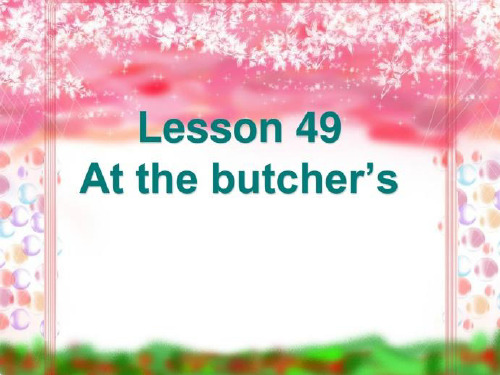
Do you want any meat today?
Yes, please. Do you want beef or lamb? Beef, please.
This lamb is very nice.
I like lamb, but my husband doesn’t. What about some steak? This is a nice piece. Give me that piece, please.
房子后面有一些鸡。
There are some chickens behind the house. ---你想吃些什么? What do you want? --- 我想吃些鸡肉。 I want some chicken.
hen [hen] chick
cock [kɔk]
母鸡
[tʃik]小鸡 公鸡
4. lamb n. 羊羔(可数) 羊羔肉(不可数) 你想要牛肉还是羊肉? Do you want beef or lamb ? 羊肉。 Lamb, please .
a lovely lamb
5. mince n. (UC)
我想要一磅的肉馅。
I want a pound of mince.
6. chicken 鸡、鸡肉
2. meat 肉
你想吃些肉吗? Do you want any meat?
3. beef n.
你想吃牛肉吗? Do you want any beef ? 盘子里没有牛肉了。 There isn’t any beef on the plate.
steak 牛排 a piece of steak 一块牛排
❖ 9. either adv.
我老公喜欢牛排,我也喜欢。 My husband likes steak . I like steak, too .=I also like steak . 我老公不喜欢牛排,我也不喜欢。 My husband doesn’t like steak. I don't like steak, either .
新概念英语第一册Lesson49-50
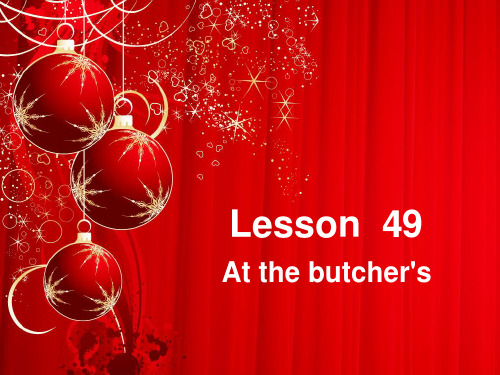
• 1.我喜欢Tank.
• I like Tank. • 2. 她喜欢Tank. • She likes Tank.
• 3. 我不喜欢猫. • I don’t like cat. • 4. 她不喜欢猫. • She doesn’t like cat.
• 5. 你喜欢狗吗? Байду номын сангаас 她喜欢狗 吗? • Do you like dog ? • Does she like dog ?
potato
Page 15
potatoes
cabbage
lettuce
pea
Page 16
bean
pear
grape
peach
Page 17
Grammar
否定和疑问句中加 助动词 do和 does
• do :I/You/We/They like • I/You/We/They don’t like • does :He/She likes • He/She doesn’t like(动词还原)
at the butcher’s 在肉店
Eg: The boy is at the butcher's . He wants to buy some meat .
Page 3
beef 牛肉(不可数)
Eg: Do you want any beef ?
steak 牛排
a piece of steak
Page 9
Mrs. Bird
butcher
What does Mrs. Bird want? She wants some beef, a piece of steak and a pound of mince.
新概念1 lesson49 &50

[læ m] lamb
[steik]steak
[mins] mince
[pɔ:k]
[tʃikən ] chicken n.鸡,鸡肉
pork
• 公鸡 • cock [kɔk]
绵羊 sheep [ʃi:p]
• 母鸡 • hen [hen]
• 小鸡 • chick [tʃik] 单数 • chicken [tʃikən]复数
What about some steak?
=how about 怎么样?/如何? 因为about是介词,所以后面跟名词或者 动名词 你喜欢什么?土豆如何? What do you like ?What about potatoes?
To tell you the truth, I don’t like chicken either.
Have you ever been there?
butcher
At the butcher’s
• [m i: t] meat (食用)肉
• • • • • 是肉类的统称,不可数名词。 你想要一些肉吗? Do you want any meat? 肉丸子 meatball
[bi:f] beef
她喜欢跳舞 She likes dancing .
否定:
She doesn’t like singing.
1. 疑问句将助动词提前
Do / Does + 主语+动词~ 你每天说英语吗? Do you speak English every day? 他每天说英语吗 ? Does he speak English every day?
lamb [læ m] 小羊羔,可数 羊肉,不可数
山羊 goat [gəut]
新概念英语 第一册Lesson 49-50

Yes, she does. She likes ripe bananas, but she doesn’t want any.
13
Summary:
1.在有实义动词的一般现在时态中,如果主语是第三人称 的单数(简称三单):该动词需加: s或es
动词的第三人称单数变化规律: 1、一般情况下在动词后直接加s,如:like-likes ; read-reads 2,以s,sh,ch,x, z,o结尾的动词加es , 如:do-does; watch-watches; 3. 辅音字母加y结尾的,要变y为i再加es,如:cry-cries; carry-carries 构成否定和疑问句时,要借助一个助动词does
9
Does Mr. Wang like garden peas?
Yes, he does. He likes peas, but he doesn’t want any.
10
Does your Uncle like butter? Yes, he does, he likes butter. but he doesn’t want any.
ቤተ መጻሕፍቲ ባይዱ
15
Listening
• Look at Page 99. Lesson 50. • Look and listen . Do not speak.
• Now answer the questions. • Listen again,and repeat.
16
Written Exercise B on Page 100.
He likes peaches . But he doesn’t like apples . Does he like grapes? Yes, he does. No, he doesn’t . What color does he like?
新概念课堂笔记 第一册 Lesson 49-50

新概念英语课堂笔记第一册Lesson 49-50husband【用法】n. 丈夫【词组】husband and wife 夫妇tell【用法】v. 告诉;吩咐;讲述;辨别【词组】tell sb. to do sth. 吩咐(告诉)某人做某事tell sb (about) sth. 告诉某人(有关)某事tell sb. a story = tell a story to sb. 给某人讲故事tell the difference between A and B 分辨A 与B之间的不同truth【用法】n. 实情;真相;事实(不可数)【词组】To tell you the truth 实话说【扩展】true adj. 真实的;真正的either【用法】adv. 也(用于否定句)【辨析】also, too, either ——也also 常用在肯定句或疑问句的句中too 常用在肯定句或疑问句的句尾either 常用在否定句的句尾e.g. I also write short stories. 我也写短篇小说Do you also want to have a look? 你也想看看吗?He likes China, too. 他也喜欢中国。
Are you in Grade 3, too? 你也在三年级吗?She is not a Japanese, I’m not, either. 她不是日本人,我也不是。
My sister doesn’t like this song, either. 我妹妹也不喜欢这首歌。
meat 常用肉类名词meat n. 肉fish n. 鱼(肉)beef n. 牛肉pork n. 猪肉mutton n. 羊肉lamb n. 羔羊(肉)chicken n. 鸡(肉)turkey n. 火鸡(肉)steak n. 牛排mince n. 肉馅序数词13th~24th13th----thirteenth 14th----fourteenth15th----fifteenth 16th----sixteenth17th----seventeenth 18th----eighteenth19th----nineteenth 20th----twentieth21st----twenty-first 22nd----twenty-second 23rd----twenty-third 24th----twenty-fourthAt the butcher’s【译文】在肉店【用法】butcher 名词,“卖肉的”,表示一种传统小作坊里的手艺人,要表示他们工作的地点,就是在前面加上the,后面加上–s,要表示在这样的地方,通常用介词at。
新概念英语第一册第49-50课-At the butcher's

新概念英语第一册第49-50课:At the butcher'sLesson 49 At the butcher's在肉店Listen to the tape then answer this question. What does Mr. Bird like?听录音,然后回答问题。
伯德先生喜欢什么?BUTCHER: Do you want any meat today.Mrs. Bird?肉商:您今天要买点肉吗,伯德夫人?MRS.BIRD: Yes, please.伯德夫人:是的,我买一点。
BUTCHER: Do you want beef or lamb?肉商:您要牛肉还是要羔羊肉?MRS.BIRD: Beef, please.伯德夫人:请给我牛肉。
BUTCHER: This lamb's very good.肉商:这羔羊肉很好。
MRS.BIRD: I like lamb,but my husband doesn't.伯德夫人:我喜欢羔羊肉,可我丈夫不喜欢。
BUTCHER: What about some steak?This is a nice piece.肉商:来点牛排吗?这块很好。
MRS.BIRD: Give me that piece, please.伯德夫人:就请给我那块吧。
MRS.BIRD: And a pound of mince, too.伯德夫人:再来一磅绞肉。
BUTCHER: Do you want a chicken,Mrs. Bird?They 're very nice. 肉商:您要买只鸡吗,伯德夫人?这些鸡很好。
MRS.BIRD: No, thank you.伯德夫人:不要了,谢谢。
MRS.BIRD: My husband likes steak,but he doesn't like chicken. 伯德夫人:我丈夫喜欢牛排,但他不喜欢鸡。
新概念英语第一册第49-50课
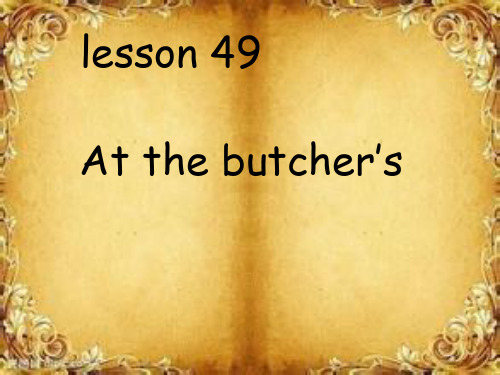
B Answer these questions using I, he or she. 模仿例句回答以下问题,选用I, he或she。 Examples: Does Penny like tomatoes? Yes, she does. She likes tomatoes, but she doesn't want any. Do you like potatoes? Yes, I do. I like potatoes, but I don't want any.
tell:tell sb. sth. 告诉某人某事 tell sth. to sb. 告诉某人某事 tell sb. about/of sth. 向某人讲起
Flash words
• • • • • • • Butcher [‘butʃә(r)] meat [mi:t] beef [bi:f] lamb [lӕm] steak [ steik] mince [mins] chicken [tʃikin]
Do you want a chiken, Mrs. Bird? They are very nice.
可数:(一整只) 鸡 不可数:鸡肉
No, thank you.
My husband likes steak, but hen.
说实话,老实告诉你
To tell you the truth, Mrs. Bird,
Do you like running man?
一般现在时
肯定结构 1.主语 + be +其它. 如:It is cold today. 2.主语 + 动词原形+其它 如:I want an apple. 3.主语 + 动词+s/es(第三人称单数作主语时) 如: She likes apples.
新概念英语第一册49-50

Truth or dare! 真心话大冒险(a game) 要钱还是要命?!
To be or not to be, that’s a question.
New Words
butcher beef husband mince tell either
卖肉的 牛肉 丈夫 肉馅 告诉 也
meat 肉 lamb 羔羊肉 steak 牛排 chicken 鸡 truth 实情
9
★ butcher
n.屠夫;刽子手
teacher
e.g.: The man is a butcher .
肉馅 鸡 告诉 实情 也不
butcher meat beef lamb husband steak
卖肉的 肉 牛肉 羔羊肉 丈夫 牛排
1 What did Mrs. Bird buy?
2 Listen to the tape, and then judge the sentences. If it is righ please say yes. If it is wrong, please say no.
have a chitchat 闲聊
video chat 视频聊天
have a chat with sb./chat with sb. 和某人聊天
18
truth n.实情,事实
true adj. 真实的 truly adv. 1. 真正地2. 忠实地, 真诚地 come true 梦想成真 true lie 真实的谎言
at the butcher's 在肉店 at the doctor's 在诊所 at Mr.Smith's 在斯密斯家 在英文表示“某一商店”的商店中,往往 可以把shop省略
新概念英语第一册Lesson49-50

mince 肉馅, 绞肉(不可数) I want a pound of mince. Because I want to make some dumplings .
chicken 鸡(可数名词) 鸡肉(不可数名词)
cock [kɔk]公鸡
hen [hen] 母鸡
tomato
tomatoes
potato
potatoes
cabbage
lettuce
pea
bean
pear
grape
peach
Grammar 否定和疑问句中加 助动词 do和 does
do :I/You/We/They like I/You/We/They don’t like does :He/She likes He/She doesn’t like(动词还原)
Lesson 49
At the butcher's
butcher 卖肉者 meat 肉 beef 牛肉 lamb 羔羊肉 husband 丈夫 steak 牛排 mince 肉馅 chicken 鸡 tell 告诉 truth 实情 either 也
steak 牛排 a piece of steak
lamb 羊羔肉(不可数) Eg: Do you want beef or lamb ? Beef , please . Lamb , please .
a lovely lamb 一只可爱的小羊羔
butcher 卖肉者
Eg: The old man is a butcher.
at the butcher’s 在肉店
Eg: The boy is at the butcher's . He wants tof 牛肉(不可数) Eg: Do you want any beef ?
新概念 1 Lesson 49~ 50

新概念1 Lesson49~50知识点讲解一、单词& 课文1.butcher n. 卖肉的人屠夫v. 屠宰butcher’s (shop) 肉店在肉店at the butcher’seg1. Jeff 是一名屠夫。
他有一个肉店。
Jeff is , he a .eg2. 你想去肉店吗?want to go to ?2.meat 肉beef 牛肉chicken 鸡肉mutton 羊肉lamb 羔羊肉pork 猪肉s t eak 牛排mince 肉馅一片牛排a piece of steak 一磅肉陷 a pound of minceeg1. 你是想要牛肉还是羊肉?Do you or ?eg2. 请给我牛肉。
,please.eg3. 这个羊肉非常好。
This is very .eg4. 我喜欢羊肉,但是我丈夫不喜欢。
I but my . eg5. 来点牛排怎么样?What some ?eg6. 再来一磅肉陷。
A of ,too.eg7. 你想来只鸡吗?Do you ?eg8. 不要了,谢谢。
No,.eg9. 我的丈夫喜欢牛排,但是他不喜欢鸡。
My ,but he doesn’t like .eg10. 我也不喜欢鸡。
I .3.husband 丈夫- 妻子4.tell - told 讲/告诉tell sb. to do sth. 告诉某人做某事tell a story/joke 讲故事/笑话tell sb about sth. 告诉某人关于.... to tell you the truth 跟你说实话吧eg1. 我一直告诉你要努力学习。
I always you study hard . eg2. Tom 告诉我做作业。
Tom me do my homework .eg3. My mother (tell) me story every night.eg4. Jack really likes (tell) jokes.5.truth n. 实情真相true adj. 正确的对的真的eg1. 跟你说实话吧,我不喜欢他。
Lesson 49-50(讲义)新概念英语第一册

Lesson 49 At the butcher's [词汇](11)butcher n. 卖肉的meat n. 肉beef n. 牛肉lamb n. 羔羊肉husband n. 丈夫steak n. 牛排mince n. 肉馅,绞肉chicken n. 鸡tell v. 告诉truth n. 实情either adv. 也(用于否定句)★butcher n. 卖肉的在英文表示“某一商店”的商店中,往往可以把shop省略,如课文中的the butcher’s (shop)和the greengrocer’s (shop),类似的例子还有the hairdresser’s (shop),the stationer’s (shop),the docter’s (office),my mother’s (house)等。
★tell v. 告诉tell the truth 说实话tell a lie 撒谎tell a story 讲故事tell sb. to do sth. 告诉某人做某事say 说话,强调说话的内容say to oneself 自言自语speak 讲话,强调说话的动作,讲某种语言speak to sb. 和某人讲话speak of sb. /sth. 谈到某人/某事Do you speak English?talk 谈话,谈论某些事情talk about 谈论关于……talk of 谈到talk show 脱口秀talk to sb. 和某人谈话chat 聊天chat room 聊天室chitchathave a chat with sb./chat with sb. 和某人聊天★truth n. 实情,事实true adj. 真实的come true 梦想成真true lie 真实的谎言★either adv. 也(用于否定句)either一般用于否定句,位于句末,前面通常有逗号。
新概念英语第一册第49-50课.ppt

Everyday English
1.Time flies. 时间飞逝。
2. I will pick you up.
我来接你。
meat[mi:t] n.(食用)肉
mince[mins] n.肉馅,绞肉
beef
[bi:f] 牛肉
steak
[steik] 牛排
❖ At the butcher’s ❖ 方位副词at与in的区别是,at和in在…里;但at表示
的地方较小,而in表示的地方很大,例: ❖ at the school ❖ at home ❖ in China ❖ in Asia ❖ in Changzhou
What about some steak? 来点牛排怎么样? =How about 怎么样?/如何? You look blue, how about watching a
❖ either一般用于否定句,位于句末,前面通常 有逗号。
❖ too常用于肯定句,有时也用于疑问句,但不 能用于否定句。常见于句末,too前常有逗号; 如果不在句末,too前后都应当有逗号。
❖ also 用于肯定句中,位于居中
Listening
1. Mrs. Bird like lamb.
Yes
Husband ['hʌzbənd] (丈夫)
Wife
(妻子)
★ husband n.老公,丈夫
We are husband and wife. = We are a couple [‘kʌpl] 一对. 夫妻之间的称呼: honey dear darling sweet baby
★ tell [tel] v. 过去式 told
- 1、下载文档前请自行甄别文档内容的完整性,平台不提供额外的编辑、内容补充、找答案等附加服务。
- 2、"仅部分预览"的文档,不可在线预览部分如存在完整性等问题,可反馈申请退款(可完整预览的文档不适用该条件!)。
- 3、如文档侵犯您的权益,请联系客服反馈,我们会尽快为您处理(人工客服工作时间:9:00-18:30)。
Lesson 49-50 At the butcher’s
Everyday English
1.Time flies. 时间飞逝。
2. I will pick you up. 我来接你。
Warming Up
Have you ever been there? Do you eat meat every day?
New words and expressions
★butcher n.
a person who sells meat
e.g.: The old man is a butcher .
at the butcher's ------ a place where you can buy meat.
egg: The boy is at the butcher's . He wants to buy some meat .
在英文表示“某一商店”的商店中,往往可以把shop省略,如课文中的the butcher’s (shop)和the greengrocer’s (shop),类似的例子还有the hairdresser’s (shop),the stationer’s (shop),the doctor’s (office)等。
butcher n.屠夫;刽子手(残忍的或滥杀无辜的人)
He is a real butcher!他是嗜杀成性的人。
★meat 肉(食用)
Do you want any meat?
Do you want any beef ? There isn’t any beef on the plate.
★steak n. (UC)
a piece of steak
---How do you like your steak?
你想怎样吃你的牛排?
--- Steak rare/medium/well-done.
生些/五分熟/全熟。
Waiter, this steak is too rare.
服务生,这牛排太生了。
How will you like your steak? Rare!
您要怎么做的牛排?嫩些的!
I want my steak medium rare, please.
我要半生的牛排,麻烦你。
Would you like the steak well done or rare?
你喜欢牛排煎得透一点,还是略生一点?
★lamb n. (uc)
the meat from lambs
e.g.: Do you want beef or lamb ?
Lamb , please .
a lovely lamb
She's as gentle as a lamb.
The life of the wolf is the death of the lamb.有活的狼就有死的羔羊。
★mince n. (UC)
I want a pound of mince.
Because I want to make some dumplings .
★chicken n.鸡,鸡肉
hen [hen]母鸡
chick [tʃik]小鸡
cock [kɔk]公鸡
★husband
spouse配偶, 夫或妻
复数spouses
couple 夫妇,夫妻
We are husband and wife. = We are a couple *‘kʌpl]一对.
夫妻之间的称呼:
honey dear
darling sweet
baby
What do you call your husband?
★tell v. 过去式told
I told you something about my husband just now .
to tell you the truth ……说老实话
To tell you the truth, I don't want to tell you this .
To tell you the truth, we can’t lower the price again.
To be frank, =frankly
truth n.实情,事实
true adj. 真实的
truly adv. 1. 真正地2. 忠实地, 真诚地
come true 梦想成真
find out the truth 找到真相
The truth is … 真相是/事实是…
★either adv.
My husband likes steak .
I like steak, too . =I also like steak .
Do you like steak too ?
My husband doesn't like chicken.
I don't like chicken, either .
I like lamb, too. 我也喜欢小羊肉。
Can I come, too? 我也来,行吗?
I, too, have been to Shanghai. 我也到过上海。
either一般用于否定句,位于句末,前面通常有逗号。
too常用于肯定句,有时也用于疑问句,但不能用于否定句。
常见于句末,too前常有逗号;如果不在句末,too前后都应当有逗号。
also 用于肯定句中,位于居中
She doesn’t like him, me either!
You have a car, me too!
You are single? Me too!
Do you want to drink beer too?
Translation
1. 老实说,我也不喜欢抽烟。
2. 事实上,我也想去上海。
3. 实话说,我不想去肉档,因为我老婆不喜欢吃肉,我也不喜欢!
Listening
1 What did Mrs. Bird buy?
True or False
1.Mrs. Bird like lamb.
2.Mrs. Bird’s husband like lamb too.
3. Mrs. Bird like chicken.
4.Mrs. Bird doesn’t like chicken.
5. Mrs. Bird’s husband doesn’t like steak.
知识点
At the butcher’s
方位副词at与in的区别是,at和in在…里;但at表示的地方较小,而in表示的地方很大,例:
at school , at home
in China, in Asia, in Beijing
选择疑问句:
What would you like to drink? 你喜欢喝什么?(无限性选择)
Which/What would you prefer, tea or coffee? 茶和咖啡,你喜欢哪一种?(两项选择) Would you like tea, coffee, or milk? 你喜欢茶、咖啡、还是牛奶?(3项选择)
How shall we go, by bus or by train? 我们怎么走?乘公共汽车还是坐火车?
Did you go there, or didn't you? 你去了那儿还是没有去?
Did you or didn't you go there? 你是去了还是没有去那儿?
Grammar
助动词do, does
在英语中,助动词一般没有词义,主要帮助构成谓语,表示时态,语态或构成疑问及否定。
do :主语为I, you及复数时。
do not = don’t (否定形式)
does :主语为第三人称单数时。
does not = doesn’t (否定形式)
1. I like milk.
2. I don’t like milk.
3. He likes apples.
4. He doesn’t like apples.
don’t = do not
doesn’t = does not
Do you like Tank ?
Does she like Tank ?
1.肯定句
主语+动词~
I speak English every day.
He speaks English every day.
2.否定句
主语+don’t / doesn’t +动词~
I don’t speak English every day.
He doesn’t speak Engli sh every day.
3.疑问句将助动词提前
Do / Does + 主语+动词~
Do you speak English every day?
Does he speak English every day?
Key to exercises:
A He likes coffee, but I don't.
B Yes, he does. He likes cabbage, but he doesn't want any.
Yes, I do. I like peas, but I don't want any.。
